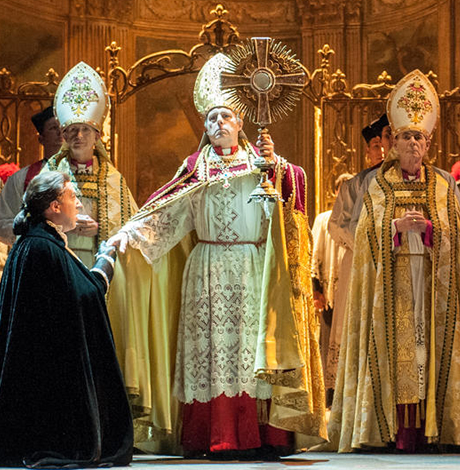Arts & Entertainment
The way to your partner’s heart
Several posh bistros offer perfect settings for Valentine’s romance
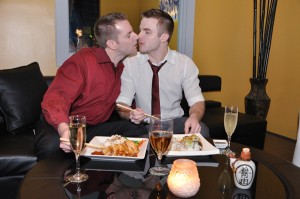
Who knew sushi was an aphrodisiac? Mike Olson and Dean Barnes get close at the fabulous new Tsunami. (Blade photo by Michael Key)
Feb. 14 is D-Day for romance — the annual Valentine’s Day celebration of affection between intimate companions or those looking for it.
So consider a few ways to show your affection with food, by dining out on the day itself.
For sushi lovers, the new Tsunami Sushi and Lounge on 14th Street, N.W., between N and Rhode Island Avenue is a great start.
There are many types of sushi, but most often we think of it as what is actually “sashimi,” when it’s simply raw fish that’s been sliced, or as “nigiri,” when it’s a mounded rectangle of rice topped with something.
Bottom line: Sushi is sexy. To the eyes — and on the tongue. Just ask Vena (but her intimates call her “Wee”) W. Doungchan, the stunning and seductive Thai-born hostess and marvelous manager at Tsunami. But the restaurant and bar’s slogan nevertheless is “we don’t make waves, we make sushi.”
Born a boy biologically in small-town Thailand in 1973, Vena (a name she chose for herself to replace her male name, Weerasak, says she knew from at least age 6 that she was not a boy but a girl. When she could, though never at school, she often dressed in skirts from then on and when she went to university at 18 to study hotel management, she says “I grew my hair, put on make-up,” and a year later began hormone therapy.

Vena W. Doungchan, the Thai-born hostess and marvelous manager at Tsunami. (Blade photo by Michael Key)
She moved to the United States in 2000 and after a number of years first in San Francisco and then New York City, she was asked last year by the owner of Thai Tanic, the restaurant located beneath second-floor Tsunami, to come to D.C. and help open what was at first planned only as a bar and lounge but later expanded to the sushi menu, under the skilled culinary baton of Vietnam-born but Ohio-raised executive chef Nick Vu Hoang. Not to be missed are several of his favorites, such as a tuna tartare topped with a quail egg or duck-breast nigiri topped with luscious seared foie gras and miso-flavored pineapple and plum.
Like Vena, the restaurant and bar are sleek and stunning, and include an intimate third-floor loft area, with a modern look of contrasting white and black leather chairs and sofas.
Switch cuisine gears now for the new Italian Renaissance in the casual but upscale brasserie style of Ristorante Posto, also on 14th Street, N.W., serving classic and modern Italian food (but with a clear accent on the latter mood) that is simply “delizioso,” accessible comfort food to set your love thermostat on warm. A little-sister restaurant to the even more upscale downtown D.C. trattoria-like Tosca (1112 F St., N.W.), Posto is presided over (like Tosca) by its executive chef — a maestro famed among foodies — Massimo Fabbri, born just 30 miles north of Florence who as a boy aspired to become a chef, who moved when grown to London and then in 2001 to D.C. where he worked for a time at Tosca, revisited Italy for a several-year stretch, but then returned to D.C. and now lives with his wife Alexis just a few blocks from Posto.
Located only steps away from the Studio Theatre in a onetime car dealership, with floor-to-ceiling windows, simple cool lighting and stark furnishings and bright artwork, Posto has become a stylish mecca for trend-spotters and is known especially as a recent haunt for Obama White House and administration heavy hitters like former chief of staff Rahm Emanuel and political strategist David Axelrod.
Posto’s fare includes a tasty array of nine kinds of pizza fresh-baked in a custom-built wood-burning oven. But its appetizers — like a dish of smooth, creamy polenta topped with rich tomato sauce and chunks of sausage — are already legendary. Also try the antipasti such as wild boar salami and duck prosciutto or the “capra” of fresh goat milk cheese with chives and black pepper.
Turn now to another great source of comfort food but in the form of contemporary American cuisine — the Beacon Bar and Grill, at the corner of 17th Street and Rhode Island Avenue, N.W.
Helmed by its affable general manager, Iranian-born Kamran Vakli, with a menu styled by executive chef Steve Hunter, and the new look in decor created by D.C. interior designer Walter Gagliano, BB&G is a triumph thronged by crowds drawn by its festive Sunday brunch, considered among the best in D.C. and also called by one reviewer D.C.’s “best bet for dinner.”
In its new interior makeover, with its palette of bold colors in fabrics and lighting choices, designer Gagliano (he’s created the signature look and feel for more than 25 D.C. eateries) took inspiration from the classic elements portrayed in Vermeer’s portrait “Girl with a Pearl Earring,” aiming, says Gagliano, for a “cleaner, more contemporary vibe.” And executive chef Hunter, who declares that, “the future is going green,” boasts of the restaurant’s reliance on local sources for seafood and veggies and that “we produce our own charcuterie and fresh sausages from organic beef and pork.”
For sure, on Valentine’s Day try one of the offerings priced (according to the selected entree) from $24.95 to $34.95, such as the crab empanadas with mole amarillo and avocado cilantro mayonnaise, grilled Amish chicken breast, or a surf and turf of fillet steak and grilled shrimp.
Lauren and Carrie Dana-Evans enjoying a romantic dinner at the Beacon Bar and Grill. (Washington Blade photos by Michael Key)
For women seeking a friendly environment, try Lace. Opened in late 2008 and located in Brookland at 2214 Rhode Island Ave., N.E., Lace is owned by lesbian Linda McAllister, a small-town girl originally from North Carolina who moved to San Antonio, Texas to “come out” and also earn her undergraduate degree there in social work. In 1995, she moved to D.C. and now lives in Brookland where she eventually decided to open an upscale restaurant, the fulfillment of her long-held dream, where “every night is ladies night,” for women of all ages but also open to LGBT and straight alike.
The slogan is “sophisticated. mature. sexy. diva. you.” Though located in a former tattoo parlor, from its chic decor, with jeweled chandeliers and textured walls and dim lighting — and its relaxed dance floo — Lace is decidedly upscale and offers dinner only, open just on weekends Friday through Sunday. The eclectic food itself is also a big draw, such as the sauteed crab cakes, the tempura seafood dish with a Cajun twist and a mouth-watering veggie quesadilla.
D.C. suffers from an embarrassment of riches when it comes to LGBT-friendly places to dine on Valentine’s Day. Here are more options to consider when booking your big night out:
Banana Café, 500 8th St., S.E., bananacafedc.com
Black Fox Lounge, 1723 Connecticut Ave., N.W., blackfoxlounge.com
Café Berlin, 322 Massachusetts Ave., N.E., cafeberlindc.com
Café La Ruche, 1039 31st St., N.W., cafelaruche.com
Commissary, 1443 P St., N.W., commissarydc.com
Logan Tavern, 1423 P St., N.W., logantavern.com
DC Noodles, 1410 U St., N.W., dcnoodles.com
Freddie’s Beach Bar, 555 S. 23rd St., Arlington, Va., freddiesbeachbar.com
Le Chat Noir, 4907 Wisconsin Ave., N.W., lechatnoirrestaurant.com
M Street Bar & Grill, 2033 M St., N.W.
Rice, 1608 14th St., N.W., ricerestaurant.com
Theater
José Zayas brings ‘The House of Bernarda Alba’ to GALA Hispanic Theatre
Gay Spanish playwright Federico García Lorca wrote masterpiece before 1936 execution

‘The House of Bernarda Alba’
Through March 1
GALA Hispanic Theatre
3333 14th St., N.W.
$27-$52
Galatheatre.org
In Federico García Lorca’s “The House of Bernarda Alba,” now at GALA Hispanic Theatre in Columbia Heights, an impossibly oppressive domestic situation serves, in short, as an allegory for the repressive, patriarchal, and fascist atmosphere of 1930s Spain
The gay playwright completed his final and arguably best work in 1936, just months before he was executed by a right-wing firing squad. “Bernarda Alba” is set in the same year, sometime during a hot summer in rural Andalusia, the heart of “España profunda” (the deep Spain), where traditions are deeply rooted and mores seldom challenged.
At Bernarda’s house, the atmosphere, already stifling, is about to get worse.
On the day of her second husband’s funeral, Bernarda Alba (superbly played by Luz Nicolás), a sixtyish woman accustomed to calling the shots, gathers her five unmarried daughters (ages ranging from 20 to 39) and matter-of-factly explain what’s to happen next.
She says, “Through the eight years of mourning not a breeze shall enter this house. Consider the doors and windows as sealed with bricks. That’s how it was in my father’s house and my grandfather’s. Meanwhile, you can embroider your trousseaux.”
It’s not an altogether sunny plan. While Angustias (María del Mar Rodríguez), Bernarda’s daughter from her first marriage and heiress to a fortune, is betrothed to a much younger catch, Pepe el Romano, who never appears on stage, the remaining four stand little chance of finding suitable matches. Not only are they dowry-less, but no men, eligible or otherwise, are admitted into their mother’s house.
Lorca is a literary hero known for his mastery of both lyrical poetry and visceral drama; still, “Bernarda Alba’s” plotline might suit a telenovela. Despotic mother heads a house of adult daughters. Said daughters are churning with passions and jealousies. When sneaky Martirio (Giselle Gonzáles) steals the photo of Angustias’s fiancé all heck kicks off. Lots of infighting and high drama ensue. There’s even a batty grandmother (Alicia Kaplan) in the wings for bleak comic relief.
At GALA, the modern classic is lovingly staged by José Zayas. The New York-based out director has assembled a committed cast and creative team who’ve manifested an extraordinarily timely 90-minute production performed in Spanish with English subtitles easily ready seen on multiple screens.
In Lorca’s stage directions, he describes the set as an inner room in Bernarda’s house; it’s bright white with thick walls. At GALA, scenic designer Grisele Gonzáles continues the one-color theme with bright red walls and floor and closed doors. There are no props.
In the airless room, women sit on straight back chairs sewing. They think of men, still. Two are fixated on their oldest siter’s hunky betrothed. Only Magdelena (Anna Malavé), the one sister who truly mourns their dead father, has given up on marriage entirely.
The severity of the place is alleviated by men’s distant voices, Koki Lortkipanidze’s original music, movement (stir crazy sisters scratching walls), and even a precisely executed beatdown choreographed by Lorraine Ressegger-Slone.
In a short yet telling scene, Bernarda’s youngest daughter Adela (María Coral) proves she will serve as the rebellion to Bernarda’s dictatorship. Reluctant to mourn, Adela admires her reflection. She has traded her black togs for a seafoam green party dress. It’s a dreamily lit moment (compliments of lighting designer Hailey Laroe.)
But there’s no mistaking who’s in charge. Dressed in unflattering widow weeds, her face locked in a disapproving sneer, Bernarda rules with an iron fist; and despite ramrod posture, she uses a cane (though mostly as a weapon during one of her frequent rages.)
Bernarda’s countenance softens only when sharing a bit of gossip with Poncia, her longtime servant convincingly played by Evelyn Rosario Vega.
Nicolás has appeared in “Bernarda Alba” before, first as daughter Martirio in Madrid, and recently as the mother in an English language production at Carnegie Melon University in Pittsburgh. And now in D.C. where her Bernarda is dictatorial, prone to violence, and scarily pro-patriarchy.
Words and phrases echo throughout Lorca’s play, all likely to signal a tightening oppression: “mourning,” “my house,” “honor,” and finally “silence.”
As a queer artist sympathetic to left wing causes, Lorca knew of what he wrote. He understood the provinces, the dangers of tyranny, and the dimming of democracy. Early in Spain’s Civil War, Lorca was dragged to the the woods and murdered by Franco’s thugs. Presumably buried in a mass grave, his remains have never been found.
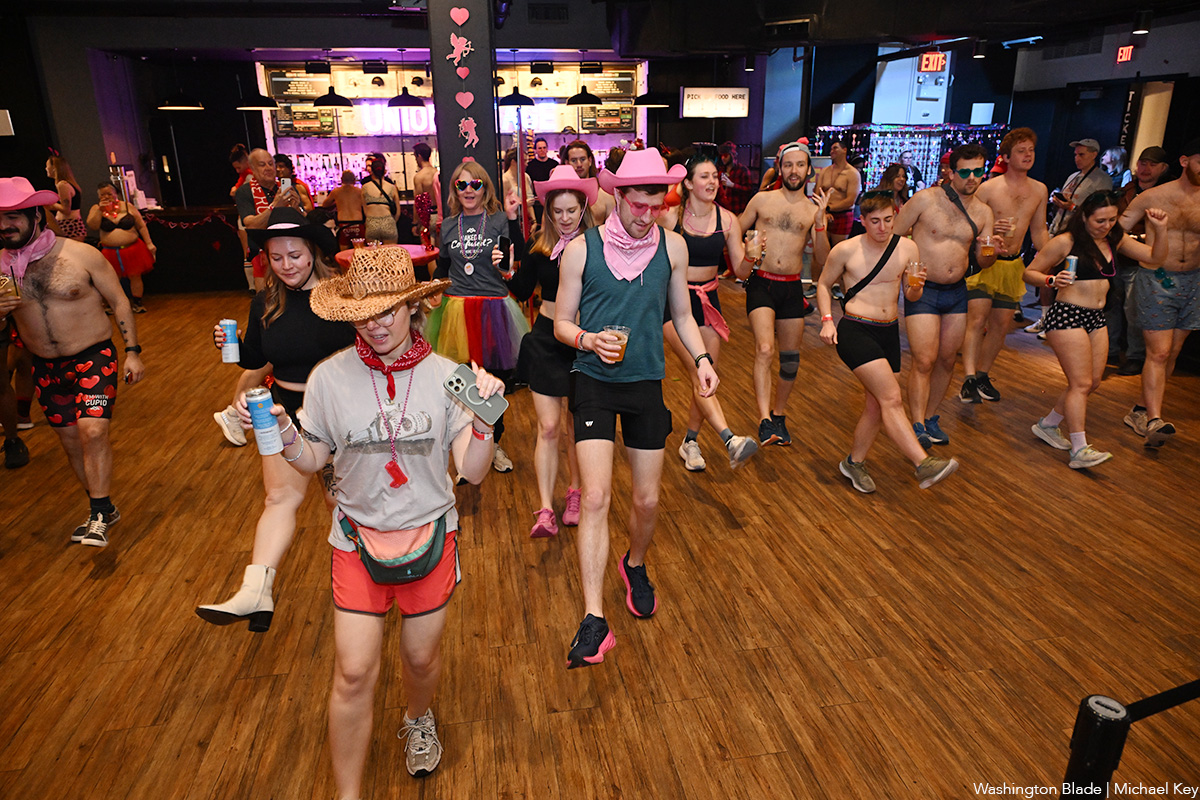
Cupid’s Undie Run, an annual fundraiser for neurofibromatosis (NF) research, was held at Union Stage and at The Wharf DC on Saturday, Feb. 21.
(Washington Blade photos by Michael Key)
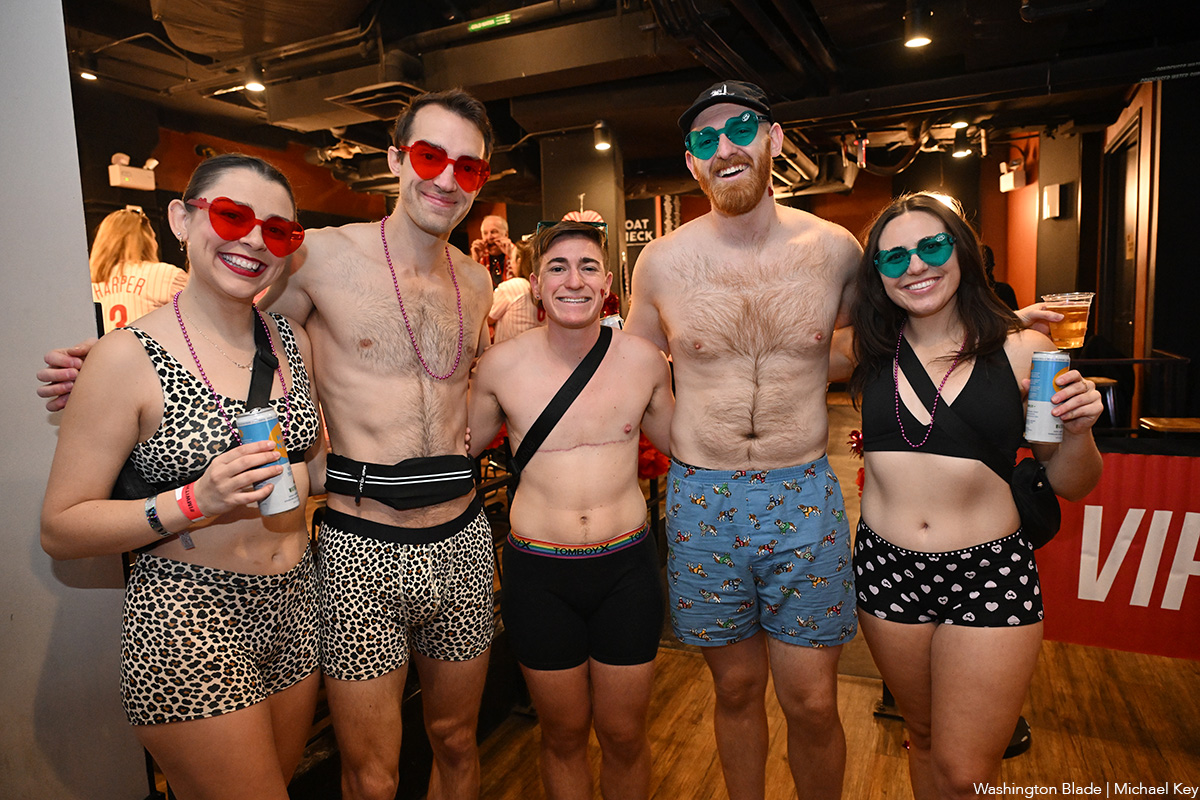
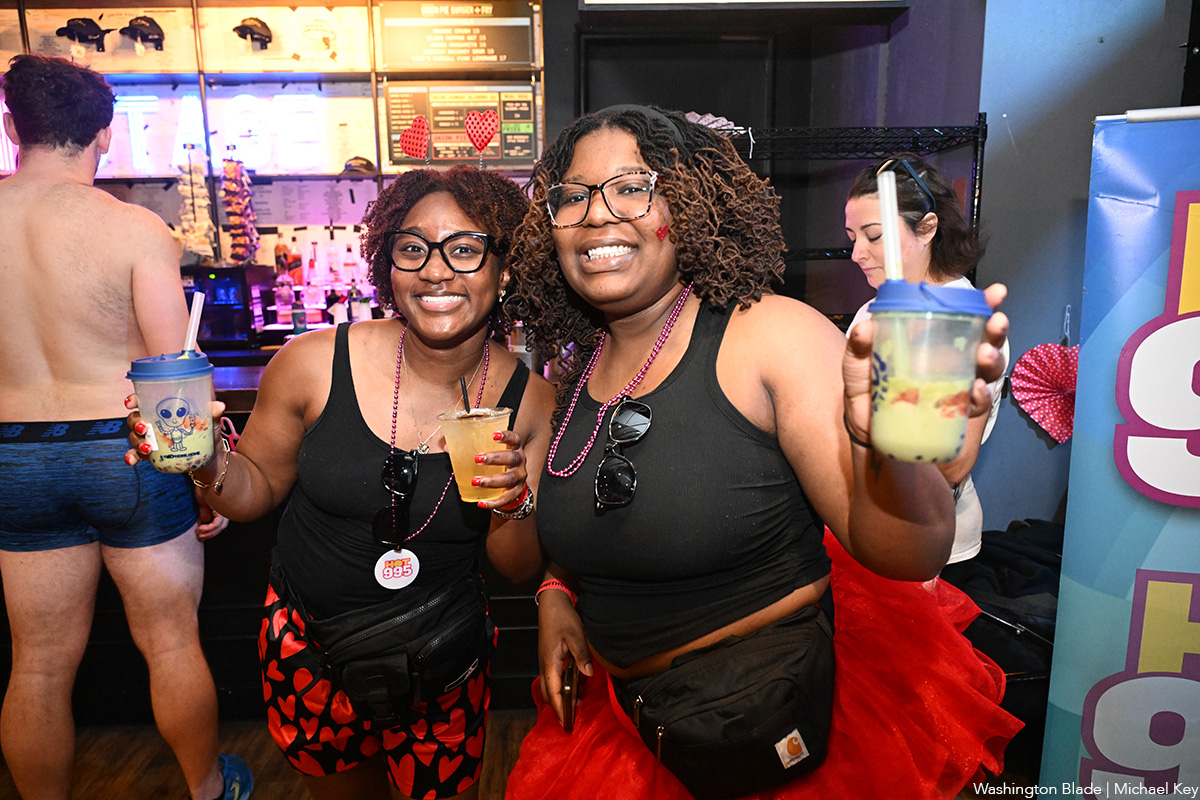
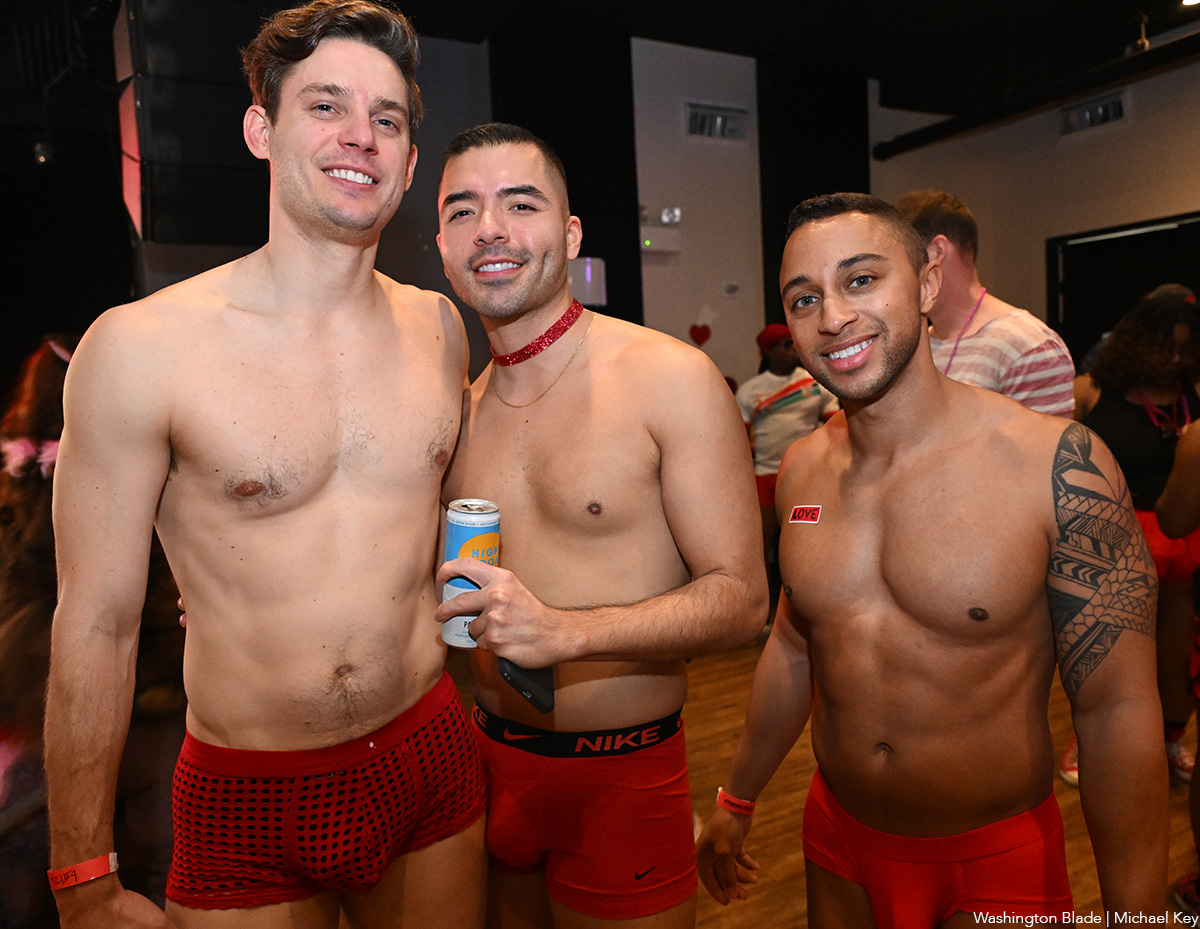
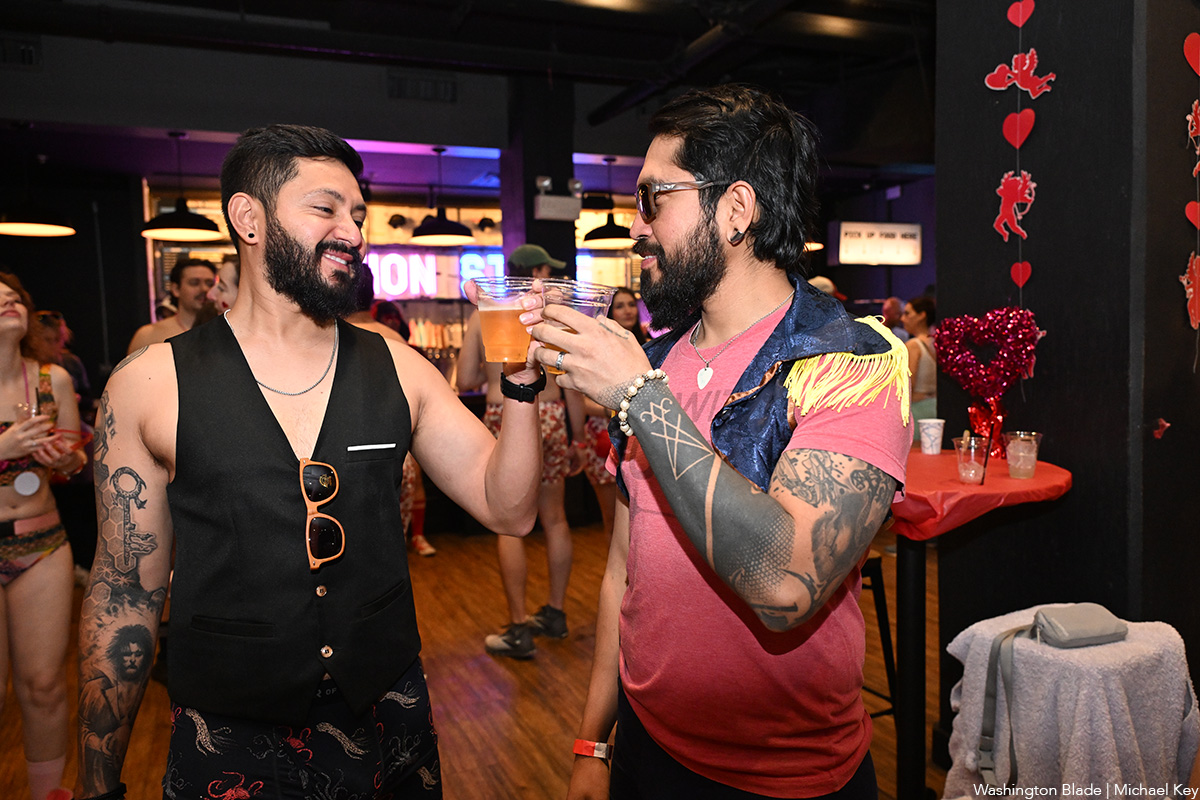

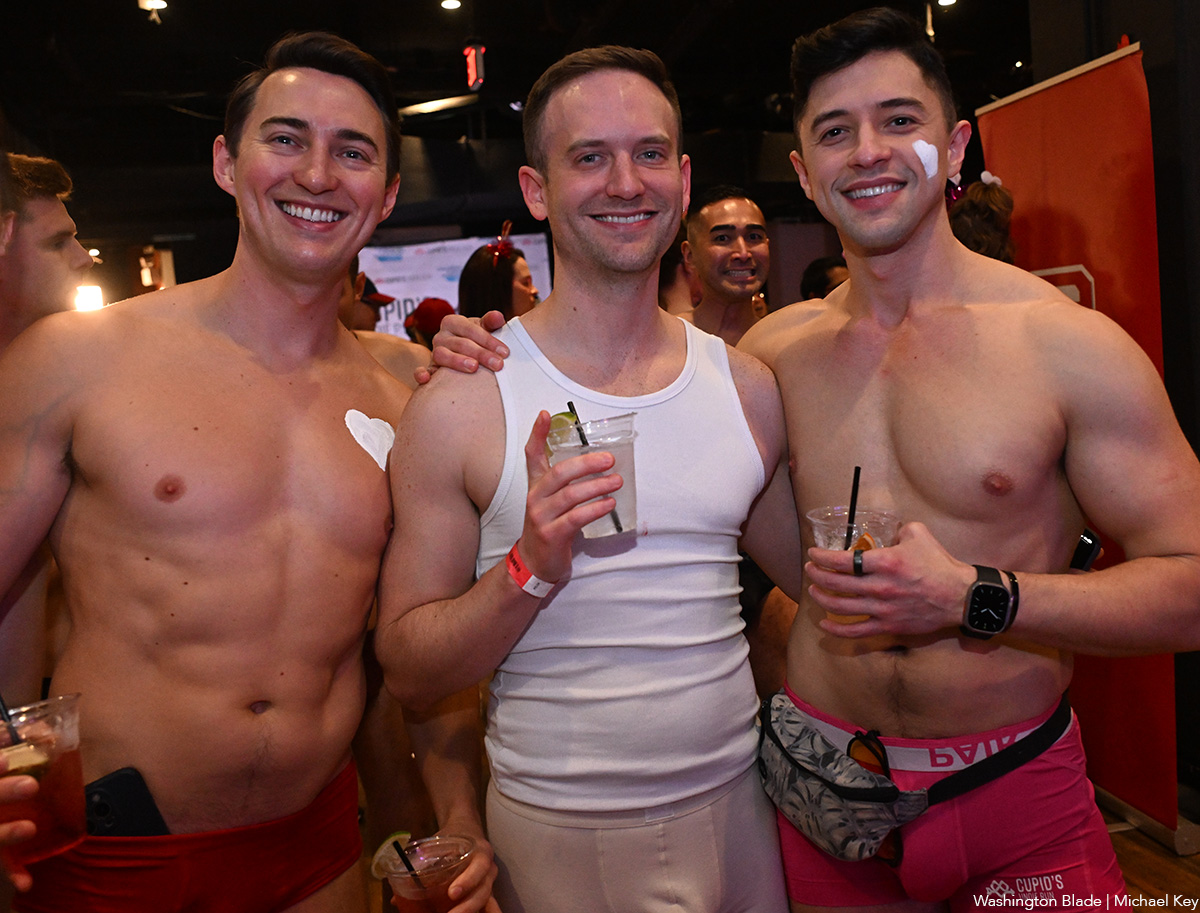
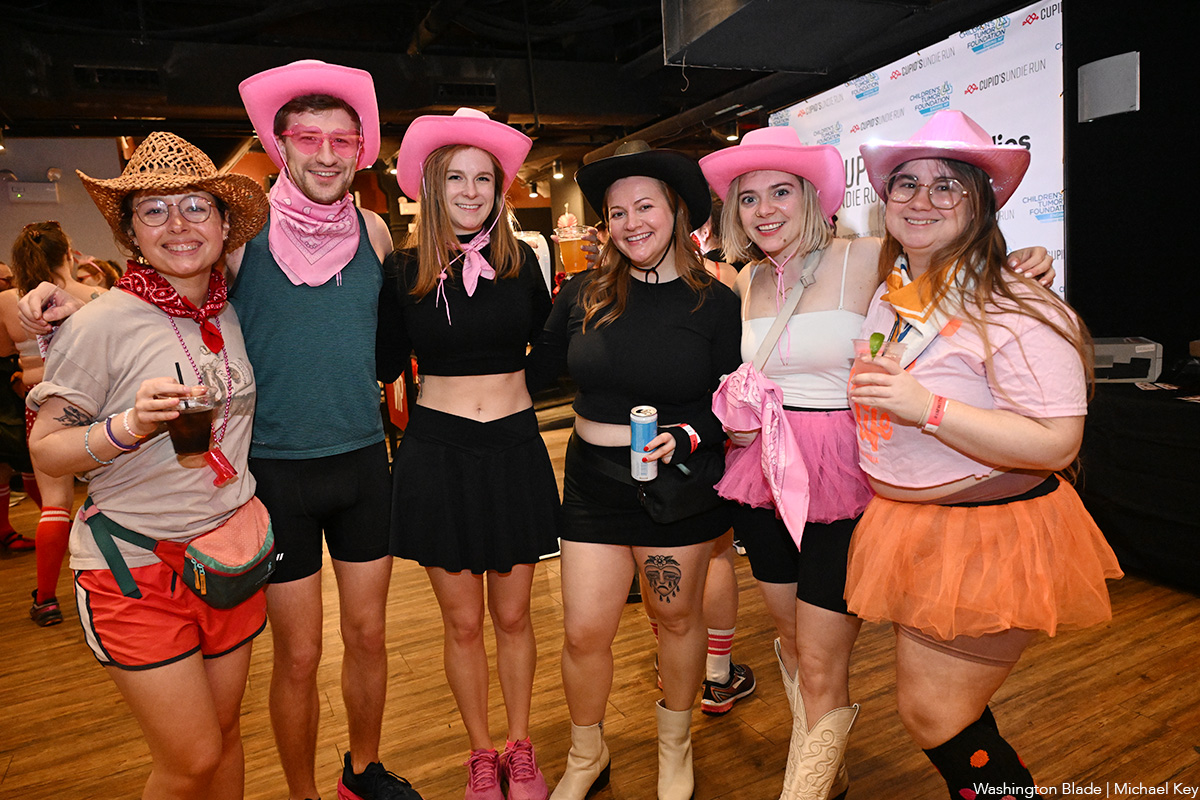
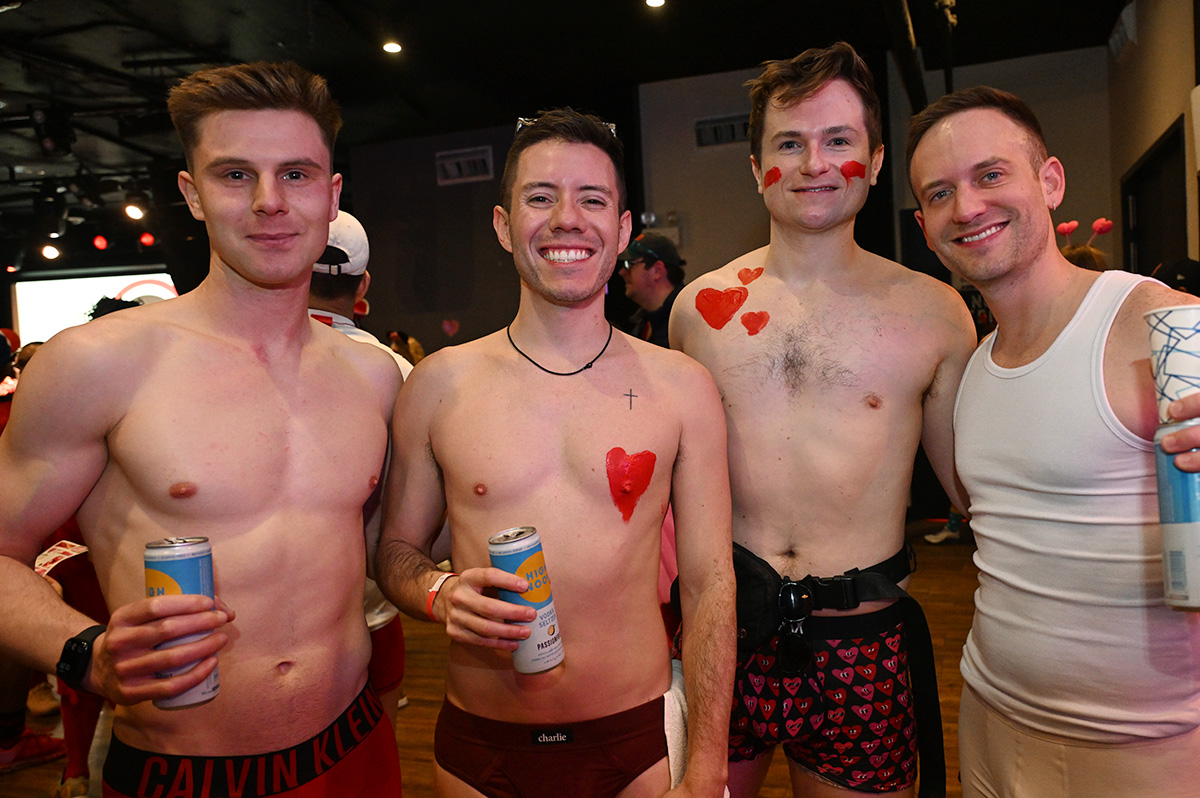
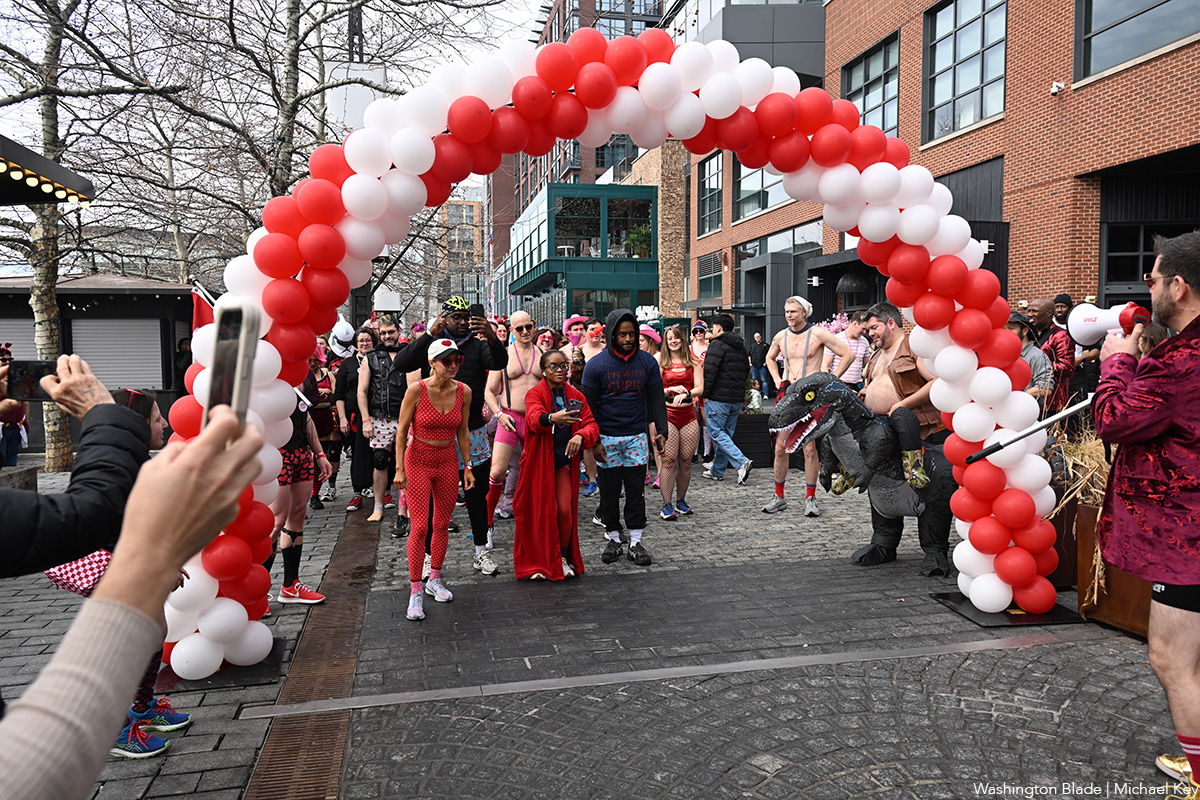
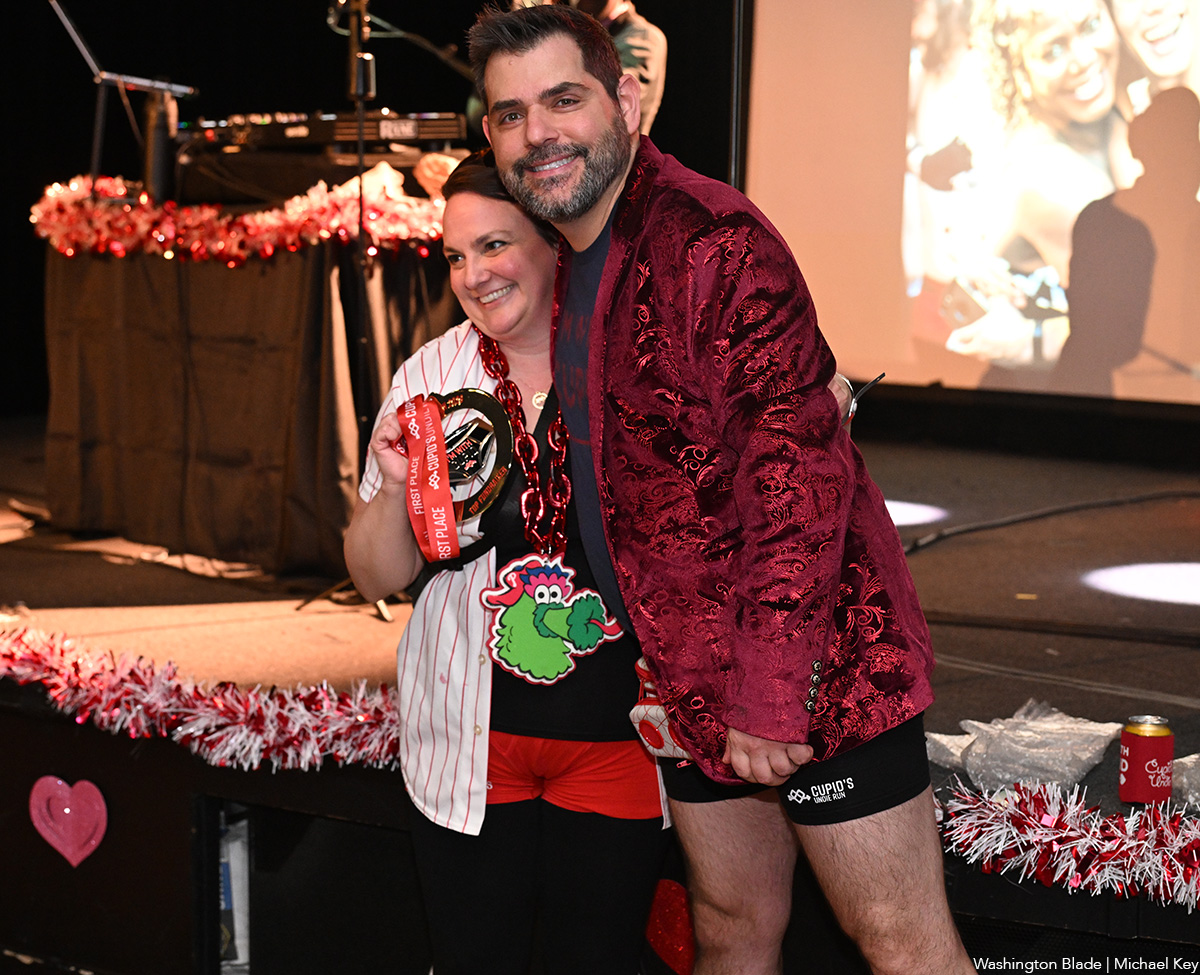
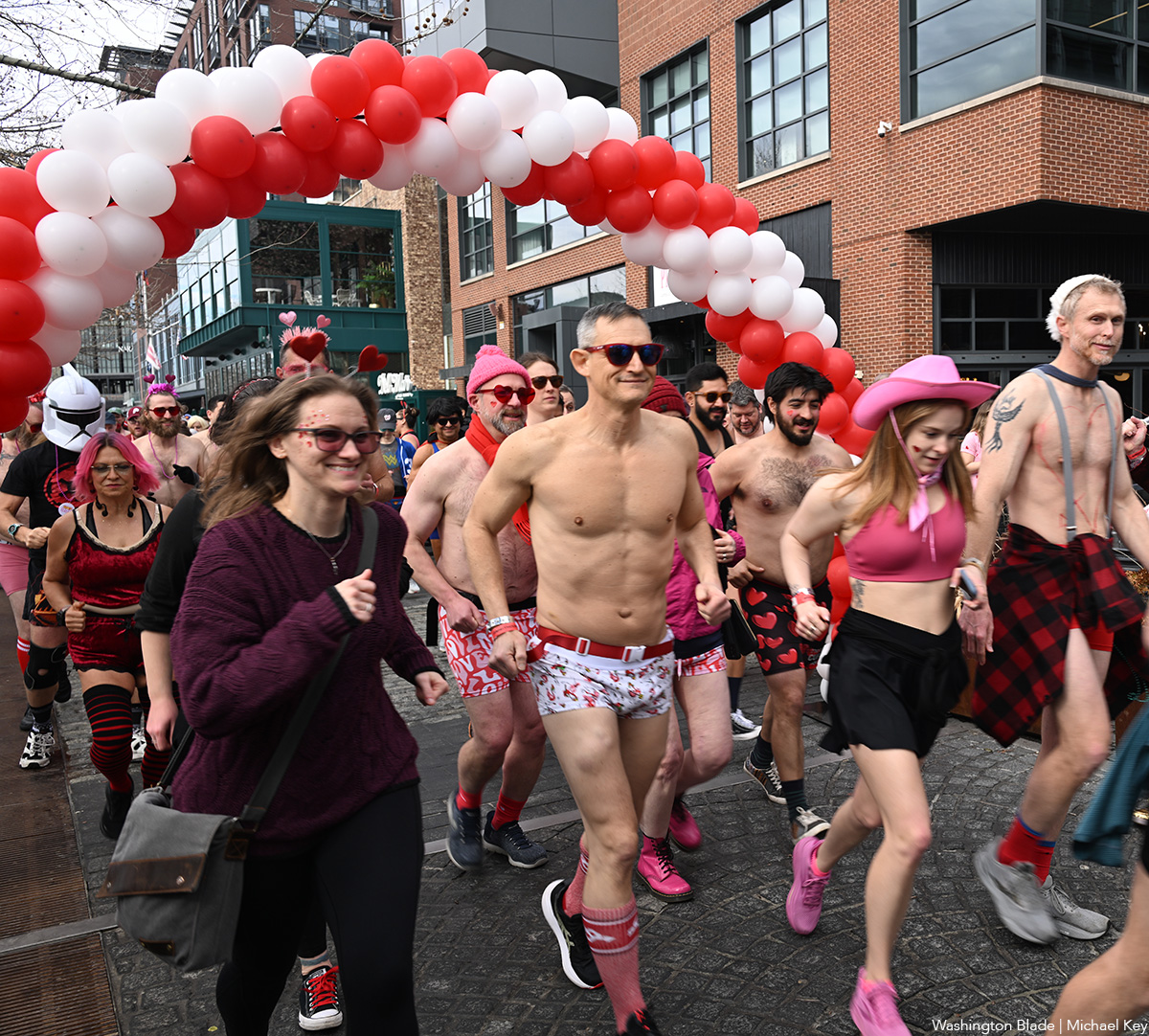

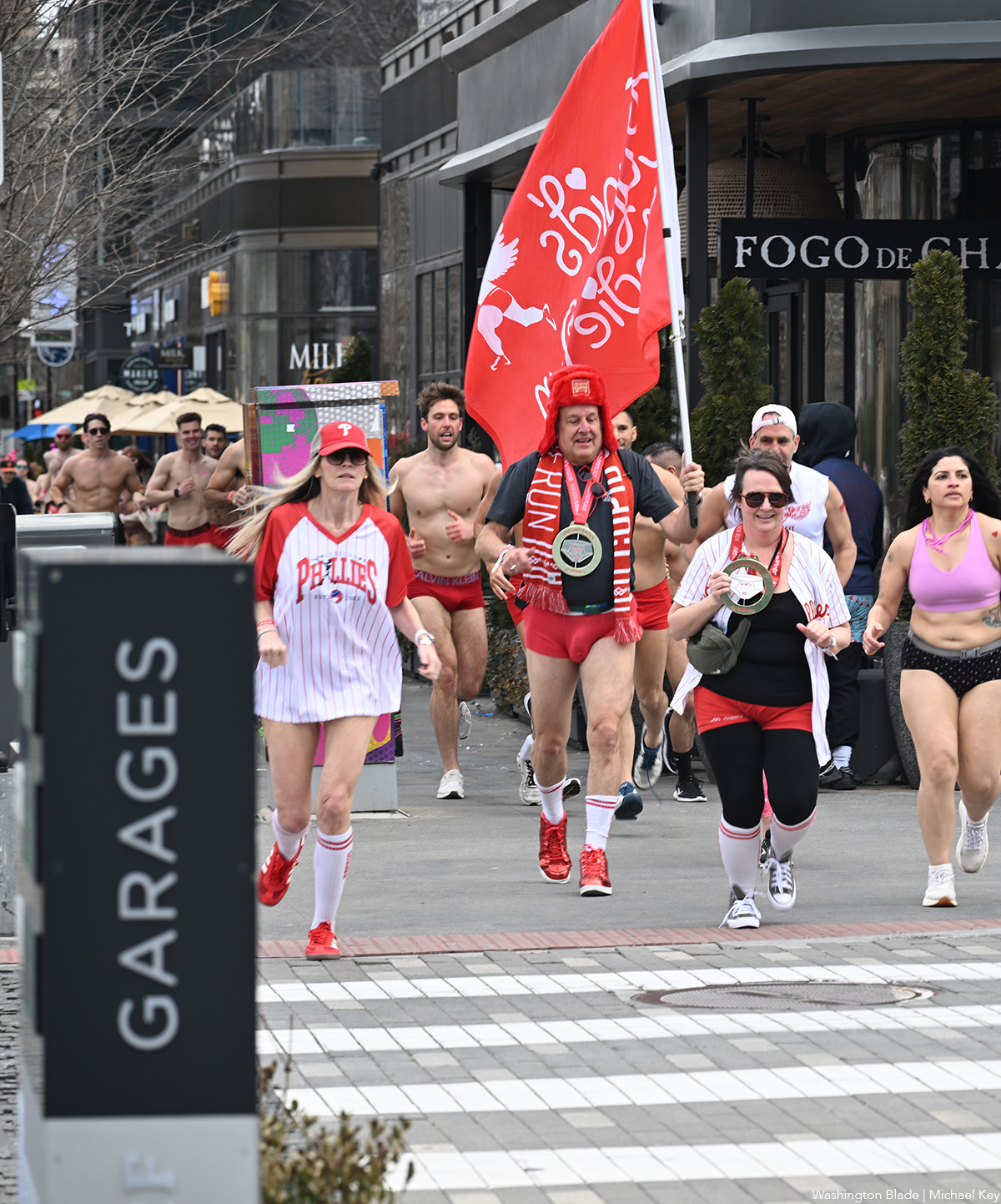

Sweat DC is officially expanding to Shaw, opening a new location at 1818 7th St., N.W., on Saturday, March 28 — and they’re kicking things off with a high-energy, community-first launch event.
To celebrate, Sweat DC is hosting Sweat Fest, a free community workout and social on Saturday, March 14, at 10 a.m. at the historic Howard Theatre. The event features a group fitness class, live DJ, local food and wellness partners, and a mission-driven partnership with the Open Goal Project, which works to expand access to youth soccer for players from marginalized communities.
For more details, visit Sweat DC’s website and reserve a spot on Eventbrite.
-

 Massachusetts5 days ago
Massachusetts5 days agoEXCLUSIVE: Markey says transgender rights fight is ‘next frontier’
-

 Opinions4 days ago
Opinions4 days agoGay Treasury Secretary’s silence on LGBTQ issues shows he is scum
-

 New York4 days ago
New York4 days agoLawsuit to restore Stonewall Pride flag filed
-

 U.S. Military/Pentagon4 days ago
U.S. Military/Pentagon4 days ago4th Circuit rules against discharged service members with HIV

